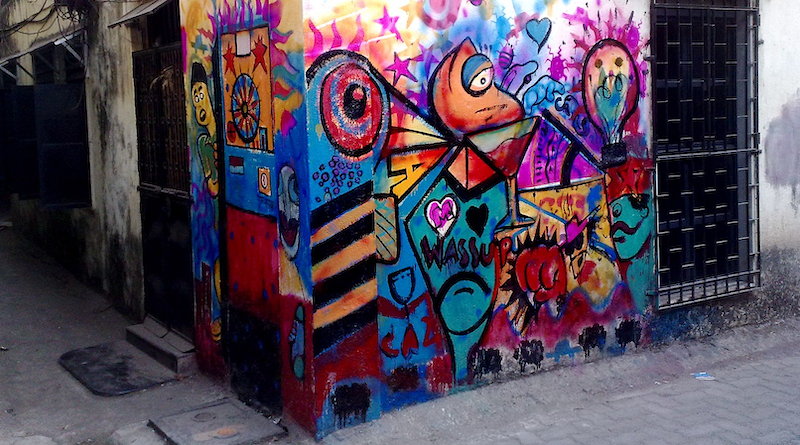A Film Industry Splashed On Public Walls In Mumbai – OpEd
The walls adjoining the streets of Mumbai’s Western suburb Bandra are strewn with art works depicting old Hindi films, graffiti and the works, converting the zone into a virtual art-lovers paradise. The wall-paintings are impressively colossal in size, strategically placed and sure to leave an indelible mark in public memory.
The Street Art that has begun making pleasant appearances across Mumbai’s streets has been facilitated by the civic authorities and overseen by local politicians. With all permissions in place and authorisations, even financial support provided through non-profits involved in the venture, Mumbai’s Street Art completely overlooks issues of strife and sensitivity that feature on public walls in most other foreign cities.
Unlike French Street Artist James Colomina, who literally lives underground and refuses to even identify himself or his family for fear of reprise, the artists working across Mumbai’s streets feature, without fear, across media. Why, most of them are art teachers, commercial artists, some even out-of-work poster artists who have been provided livelihood by the surge in Street Art across India’s financial capital.
There is simply no element of conflict in the Street Art across the public spaces of Mumbai. There’s a slim chance of an artwork being politically incorrect or harming populist sentiments when all of it has to go through the fine comb of a local politician before being vetted thoroughly by the authorities before seeing the light of the day.
And, that, is the difference in Street Art in India. Not that it isn’t good or lacks punch. It’s just that it’s different. Positively different, colourful yet bordering on inane and socially irrelevant. “I wish I can use art to highlight the issues faced by my community, in time,” sums up Sapna Patil, herself belonging to the Agri community.
Figures On Walls To Lead The Way
Look at Swaero Artist’s For Empowerment of Society (SAFE), an alumna of artists who studied in state-run social welfare schools and colleges who feel, “Education is the most powerful weapon which you can use to change the world”; “Swaero Bano-Hero Bano”; “If not now, when? If not we, then who?”
A tiny Dalit colony in Kollapadakal village of Maheshwaram that lies an hour away from Hyderabad registers the inspirational lines on a colourful mural that has become all-too-familiar to locals.
In different colours on the walls of homes, over 30 murals, featuring prominent world leaders, are popular selfie points in the area. The Street Art walls were inaugurated by senior IPS officer RS Praveen Kumar Swaero, the secretary of the Telangana Social & Tribal Welfare Residential Educational Institutions Society in 2020.
Interestingly, several murals of contemporary student achievers that include mountaineer Malavat Poorna, Kamatam Madhuri, Nemali Siddharth, Darshanala Sushma, Praveen Kumar IPS and Dalit billionaire Pagidipati Devaiah were also painted on the walls. And because, as the SAFE president feels “painting local figures will make students think to become one of them.”
Empowering Marginalised With Art To Start Anew
Literally transforming the face of Mumbai’s slums has been ‘Misaal Mumbai’ a slum painting and repairing initiative by artist, muralist and social worker Rouble Nagi started after ‘Paint Dharavi’ in 2016 in Mumbai where she, with her team, painted and water-proofed houses. The aim being not just to beautify the walls of the slums but to connect to people through Art and bring a positive change in their mindset.
Plugged as the first slum painting initiative in India, the Rouble Nagi Art Foundation painted and repaired 1,50,000 plus homes to date and are currently working in over 163 slums and villages across India.
Educating through art about the importance of children education, empowering women, creating job opportunities for youth, cleanliness, hygiene, sanitation, waste management, and children health in slums and villages, Rouble Nagi reaches out key messages through Street Art.
“Besides being a quick way to create visual impact, our projects employ people and give them a sense of ownership over the artworks they create in their own community while improving the condition of their houses,” says Rouble.
And now, with ‘Misaal Kashmir’ underway, the Mumbai-based artist with 800 murals to her credit and having organised over 150 exhibitions, is focusing on the youth of Kashmir. She believes that they need to navigate their lives with the vision of growth and positivity, stop following peers and politicians “if you feel they are leading you towards a negative path”.
Along with her team, Rouble has been travelling through Watlab, Sangrama, Handwara, Langate and the rural belt of Pulwama armed with nothing but art and paints to empower women to generate a livelihood for themselves.
The village reformation project, ‘Misaal Kashmir’ helps artists transform the community by tapping the local creative energy. It’s part of the ‘Misaal India’ initiative launched in 2018. Rouble Nagi’s attempts are bearing fruit, slowly yet surely, heralding a new beginning for those for whom all seemed lost.
(This report is part of The Art Of Cause Project – a DraftCraft International initiative that documents Art Projectsand Street Art campaigns that reach out, rectify and resolve strife, across the world)
Part 5 of 6 | To Be Continued

